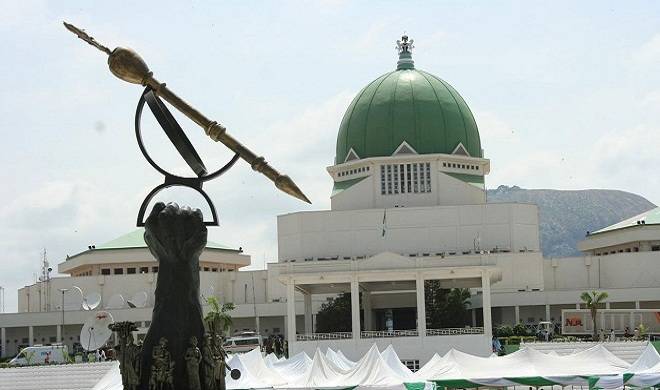It is now one year since the inauguration of the 9th House of Representatives when my colleagues elected me as the Speaker.
On that day, I committed to “use the legislative platform and the instrumentality of the law to make Nigeria a better and more perfect union”.
- How woman blackmailed House of Representatives member with pregnancy – Police
- Gbajabiamila’s House of Reforms
I have, to the best of my ability, been keeping to that commitment in the past year.
I must admit that it is our fate to have assumed office at a time of global upheaval, with relentless change, both intended and unintended, cascading all around us to remake our world.
But as lawmakers, we have been handed an opportunity to rebuild our country, to finally put Nigeria in a position to achieve the greatness long foretold, yet too long unattained.
We govern at a time of national consensus in favour of radical change.
The House had begun on this path last year when, within three months of our inauguration, we adopted a Legislative Agenda that was bold in its commitment to reform, specific in its objectives and clear on the methods to achieve those purposes.
We also committed to delivering a fixed budget cycle, and by December of 2019, we had done exactly that.
We committed to ensuring that Nigerians, wherever they may live, at home and abroad, are always assured of the support and protection of the people’s House.
Time and time again, we lived up to that commitment in South Africa, in China and everywhere and every time the interests of our people were endangered.
The 9th House has consistently extended a hand of cooperation to organised labour.
It has become a virtual certainty that it is to the House that the representatives of labour will first turn to seek resolution of crises that affect the welfare of their members and threaten to disrupt our economy and essential services, including education and healthcare.
Like us, organised labour in this country represents ordinary men and women who are doing their best to provide for their families and be satisfied in the accomplishment of earning a good living by the efforts of their own hands.
When parliament joins in common cause with labour, we reaffirm a historical partnership that accounts for much of the social progress in the world over the last century.
Our interventions on these and other matters of national importance did not interfere with or decrease the pace of our legislative output.
We have, in our first year, passed thirty-seven (37) long-awaited and much-anticipated legislation, including reforms of the federal government’s Public Procurement System, the Company and Allied Matters Act and the Deep Offshore and Inland Basin Production Sharing Contracts Act.
We have proposed and passed legislation to achieve electric power sector reform, establish a process of presidential transition that ensures continuity in government and limits the possibility of political or constitutional crisis arising from anticipated or sudden shifts of presidential power.
We heard the cries of those Nigerians, who, living with disabilities, have found their opportunities for advancement in education and professional prospects, curtailed and constrained.
We passed on their behalf, the Physically Challenged (Empowerment) Bill, 2019, to promote accessibility and ensure that the barriers that stand in the way of people achieving their dreams no longer exist.
We have delivered the Nigeria Industrial Revolution Plan Bill, and the Raw Materials Research and Development Council (Repeal and Re-Enactment) Bill, both of which will place our country on the path to industrial self-sufficiency and economic growth that lifts people out of poverty, creates jobs that pay a living wage and ensures that more of our people can contribute to the continued development of communities across the nation.
When the deadly coronavirus arrived on our shores, it exposed the structural weaknesses of our system.
We did not foresee, nor were we prepared for the global devastation of the Covid-19.
We were not ready to fight an enemy of this nature, and our lack of preparation has caused a great deal of loss and despair across our nation.
We are still at risk of more severe damage to our economy and our national security.
All of this is in addition to the existing threat of disease and loss of lives at a scale we will not long forget.
I pray for the ill and the recovering, and I commit the dearly departed to a peaceful afterlife and ask for God’s grace on those they have left behind.
The 9th House of Representatives responded to the emergence of the coronavirus by passing in one session, the Emergency Economic Stimulus Bill as the first response by any arm of government to the economic issues that we foresaw would be the consequence of the arrival of this disease on our shores.
The Federal Government of Nigeria has since begun to adopt and implement provisions of that Bill by granting deferrals on loan payments owed to federal government institutions and lifting tax restrictions on the importation of essential medical goods needed in the fight against Covid-19 in the country.
I also set up a Covid-19 Response Strategy Team (CRST) to support the development and implementation of legislative interventions in response to the weaknesses that have been revealed by our management of the pandemic and the economic and social challenges arising therefrom.
In addition, members of the House contributed two months of their salaries to the fund to fight Covid-19 in the country and inspired others to do the same across the country in whatever measure they could.
We set up an AdHoc Committee to carry out robust and joined-up oversight of the federal government’s response to Covid-19.
We advocated for and achieved greater accountability and equity in the allocation and distribution of palliatives to those of our citizens most in need of assistance.
We have initiated and are committed to a comprehensive overhaul of the statutory framework for managing public health emergencies in the country.
As part of the amendment of the 2020 Appropriation Act, we provided the N4bn to provide for the welfare of doctors in Nigeria.
This is of particular importance at this time when we are managing the public health crisis of Covid-19 in Nigeria.
The alarming rate of assault against women and children all over Nigeria calls for nothing short of a state of emergency to mobilise government resources towards ending once and for all the scourge of sexual and gender-based violence in Nigeria.
To accommodate new realities, we resolved to conduct a review of the Legislative Agenda of the House of Representatives as the first step towards designing a post – COVID-19 plan to address the identified weakness of our nationhood.
We will yearly return to that document to appraise our performance and conduct a candid assessment of our efforts.
I want to assure that I will always strive to ensure the unity of the house, recognising the particular concerns of the different constituencies that make up our great and beloved nation.
I also assure all Nigerians of our ongoing commitment to our country which call we have obeyed, whose cause we have sworn to defend until that day when peace and unity, justice and prosperity is the inheritance of all who fly our nation’s noble flag.
With God on our side, and with the support of our people, we will not fail.
Gbajabiamila is the Speaker of the House of Representatives.

 Join Daily Trust WhatsApp Community For Quick Access To News and Happenings Around You.
Join Daily Trust WhatsApp Community For Quick Access To News and Happenings Around You.

